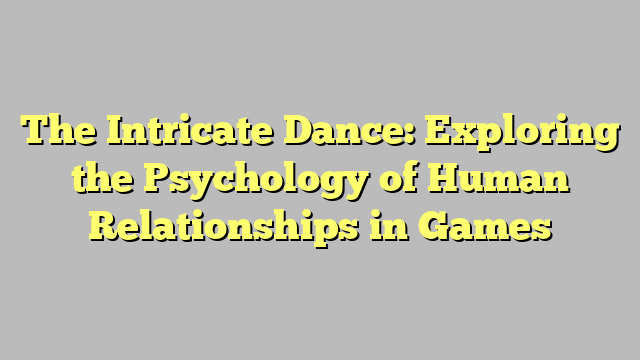The Intricate Dance: Exploring the Psychology of Human Relationships in Games
The Intricate Dance: Exploring the Psychology of Human Relationships in Games
Introduction
Human relationships are complex and fascinating, and they play a significant role in our lives. From friendships to romantic partnerships, these connections shape our experiences and influence our emotions. In recent years, the world of gaming has provided a unique platform for exploring and understanding the psychology of human relationships. This article delves into the intricate dance of human relationships in games, examining how they are portrayed, experienced, and studied.
The Portrayal of Relationships in Games
Games have evolved significantly over the years, and so has the portrayal of relationships within them. In the early days of gaming, relationships were often simplified and served as mere plot devices. However, as technology advanced and storytelling in games became more sophisticated, relationships began to take center stage.
Modern games now offer complex narratives that explore various types of relationships. From deep friendships to romantic entanglements, these games aim to provide players with a realistic and immersive experience. Characters in games are designed to be relatable, with their own unique personalities, motivations, and flaws.
One notable example of a game that delves into the intricacies of human relationships is “The Last of Us.” This critically acclaimed game follows the journey of Joel and Ellie, two survivors in a post-apocalyptic world. Their relationship evolves throughout the game, showcasing the complexities of trust, loyalty, and love in a harsh and unforgiving environment.
The Experience of Relationships in Games
Playing games that explore human relationships can evoke a wide range of emotions in players. The interactive nature of gaming allows players to form a personal connection with the characters and their relationships. As players make choices and navigate through the game’s narrative, they become emotionally invested in the outcomes of these relationships.
For example, in games with branching storylines and multiple endings, players may feel a sense of responsibility for shaping the relationships and determining their ultimate fate. This level of agency can create a deep sense of immersion and engagement, as players become active participants in the development of these virtual relationships.
Furthermore, multiplayer games provide a unique opportunity for players to form real-life connections and relationships. Online gaming communities often foster a sense of camaraderie and teamwork, allowing players to collaborate and build friendships with others who share their gaming interests. These relationships can extend beyond the virtual world, with players forming lasting bonds and even meeting in person.
The Study of Relationships in Games
The exploration of human relationships in games has also caught the attention of researchers and psychologists. The interactive nature of gaming provides a valuable platform for studying social dynamics and the impact of relationships on player experiences.
Researchers have conducted studies to understand how players form emotional connections with virtual characters and how these connections influence their overall gaming experience. They have also examined the effects of in-game relationships on players’ real-life social skills and well-being.
One study published in the Journal of Personality and Social Psychology found that players who formed strong emotional bonds with virtual characters reported higher levels of empathy and prosocial behavior in their real lives. This suggests that the relationships formed in games can have a positive impact on players’ social and emotional development.
The Role of Relationships in Game Design
Game developers have recognized the importance of relationships in creating compelling and immersive gaming experiences. They carefully craft characters and narratives that resonate with players, aiming to evoke emotional responses and create memorable relationships.
Furthermore, game designers often incorporate relationship-building mechanics into their games. These mechanics allow players to interact with characters, make choices that affect the development of relationships, and experience the consequences of their actions. This adds depth and complexity to the gameplay, enhancing the overall experience for players.
Conclusion
The psychology of human relationships is a rich and complex field of study, and games provide a unique platform for exploring and understanding these dynamics. From the portrayal of relationships in games to the experiences they evoke in players, the intricate dance of human relationships in games offers valuable insights into our own social interactions.
As technology continues to advance and storytelling in games becomes even more sophisticated, we can expect to see further exploration of relationships in this medium. Whether it’s through single-player narratives or multiplayer experiences, games have the power to deepen our understanding of human relationships and the impact they have on our lives.

